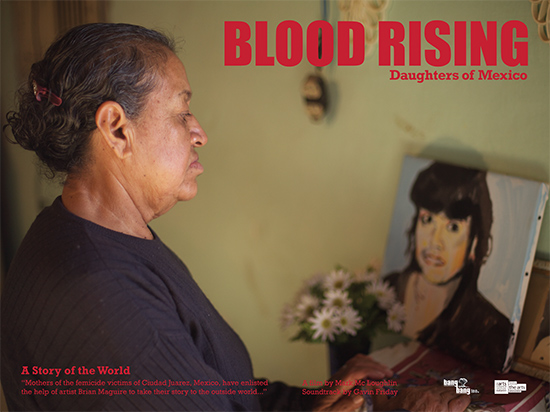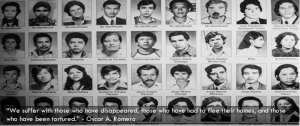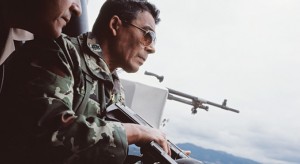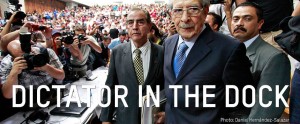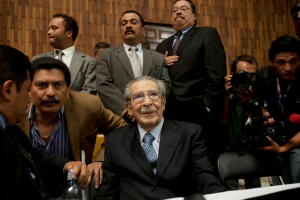The first installment of the HRI Films Series will begin Wednesday, October 1st with the screening of Blood Rising: Daughters of Mexico. The film will be followed by a panel discussion with the filmmaker Mark McLoughlin and other invited speakers. Airing at 3:30-6:00pm in Konover Auditorium, Dodd Research Center.
Tag Archives: Latin America
Sugar and Strife: the Dominican Republic and Caribbean Policies in the 20th Century
United States intervention across the South American continent largely took the form of an ideological proxy war with the Soviet Union. While these military and political conflicts varied in intensity and scope, it could be argued that U.S. engagement was never for the sake of any direct threat to national security. The same, however, cannot be said for the policies employed for the island nations of the Caribbean. While the government had the luxury of forming policy thousands of miles away, the internal affairs of nations such as Cuba, a mere 90 miles from the U.S. coast, were of large import. The Cuban Missile Crisis of 1962 had made the security concerns of the Caribbean more salient to both the American public and actors in Washington D.C.
The island nation of Cuba has long been a geopolitical thorn in the side of the United States. As a Spanish colony, Cuba represented a threat to the established “Monroe Doctrine” of western supremacy, and even as Spanish influence waned the American government sought to control the nation through economic and political actions. Following the Revolution of 1959, Fidel Castro assumed power, relations between the two nations deteriorated as his Regime aligned itself with the Soviet Union. In return for economic aid and political support, the island became a strategic position for Soviet military resources, with the Cuban army often acting as a paramilitary group in the proxy wars in South America that I have focused on in my previous posts. U.S. policies regarding Cuba underscored the need for intervention across the Caribbean in order to protect regional security interests.
U.S. Political Leadership & El Salvadorian Policy
Michael Piersall is a senior undergraduate student in Political Science and Human Rights minor. In his blog series, he will study materials available in the Dodd Research Center’s collections to explore American Political Leadership with regards to Cold War activities in Latin America.
As a Political Science major, my academic focus often centers on the decision making process behind government action. As an “American-ist” more specifically, my interest lies in the deliberation and processes of the federal institutions that comprise the United States government. This semester, I have been given the privilege to examine materials in the Thomas J. Dodd Research Center that relate to U.S. governmental actions precipitated by its political hegemony, specifically in Latin America. While these materials are in no way restricted from public access, I deem this a privilege because I am, above all else, a current-affairs wonk; I prefer analyzing events through their perception in contemporary contexts than an isometric historical glance that one can find on, for instance, Wikipedia. Further, my academic orientation towards Human Rights, specifically political and economic rights has provided a lens for additional analysis of the international consequences of U.S. actions.
To that end, I have spent the last few weeks reviewing several documents from the Human Rights Collections that pertain to the U.S. covert operations of the late-1970’s and 1980’s in El Salvador. This assertion of U.S. hegemony is an example of its late 20th Century brand of foreign intervention. Beginning under President Carter, and dramatically expanded under Reagan, this incursion into the domestic affairs took the form of economic, political, and covert wars. Robert Armstrong and Phillip Wheaton, left-leaning journalists for Solidarity Publications, define the two political camps advocating for intervention in El Salvador as either the “Militarists”, bureaucrats in the Department of Defense, the Central Intelligence Agency and other such institutions, and the “Reformists” in offices such as Agency for International Development or the quasi-public American Institute for Free Labor Development, which was created in concert with the AFL-CIO and the funding of the U.S. federal government.
Tutela Legal Archives
A report came out on October 4th, that the offices of a well respected Human Rights monitoring organization in San Salvador, Tutela Legal, were closed by its governing body, the Archdiocese of El Salvador. Contained in these offices are the archives of the organization dating back to the late 1970s when El Salvador’s US backed dictatorship was terrorizing the civilian population as a response to the cold war. Tutela Legal’s archives document disappearances and abuses which were recorded in hundreds of case files compiled from testimonies of witnesses and survivors.
Currently, the records remain in the hands of the Archdiocese, which has safely housed the organization since the state terror period as a continuation of Archbishop Oscar Romero’s vision of human rights and liberation. In the mid-1990s, University of Colorado at Boulder Archivist Bruce Montgomery funded a mass reproduction of Tutela Legal’s archives in order to store facsimiles outside of the country at his institution. During that period, an amnesty law was passed making any future legal convictions regarding war crimes or crimes against humanity during the conflict period illegal in El Salvador. Effectively, ‘it’s been dealt with, now go away.’ The eventuality of records destruction or alteration in human rights organization records outside the archival sphere makes collaborative projects like this between CU Boulder and Tutela Legal a reminder of the tenuousness of grassroots organization archives as well as the necessity for outreach from archivists to solidify networks of information solidarity.
2013-2014 Human Rights Film Series
The first installation of the 2013-2014 Human Rights Film Series is upon us. On Wednesday September 11, Granito: How to Nail a Dictator will be shown in the Konovar Auditorium at the Dodd Research Center from 4-7pm. This award winning documentary (often promoted on this blog) provides rich context for the recently scrutinized trial of Guatemalan General Rios Montt. The film will be followed by a discussion with expert forensic anthropologist Dr. Victoria Sanford of the Lehman Center for Human Rights and Peace Studies.
Details can be found on Events Calender
Dictator in the Dock
Trial film series of Rios Montt, Dictator in the Dock, has been compiled and is available online through skylight pictures.
Rios Montt does the Pinochet
10 May 2013:
Over thirty years after the Scorched Earth campaign by the military and death squads in Guatemala, General Efrain Rios Montt is convicted of genocide committed against the Mayan’s of the Ixil region. Like the notorious Chilean dictator, Augusto Pinochet, Montt (86 years old) was brought to trial late in life – however, the distinction of having been forced into the courtroom, despite legal defense attempting to waylay the inevitable, is what stands between the two notorious figureheads. Montt’s sentence of 80 years in prison stands as a penalty for the crime versus a punishment he can withstand. This precedent setting national conviction will serve as a warning to both heads of state and top ranking military officials that impunity, even in the most stratified of countries, can be challenged.
Filmmakers Pamela Yates and Paco de Onis (When the Mountains Tremble and Granito) were on hand for both the filming of the trial as well as witnessing their own footage used as evidence in the closing remarks against Montt. A great collection of daily summaries from the trial can be seen in their ongoing film series Dictator in the Docket. Though the conviction has happened, the greivances still exist for the crimes committed in Guatemala. With this piece of history, a social dialogue can begin to unpack the roots of an extermination campaign against indigenous peoples and their corresponding position in society today.
Human Rights and Archives Lecture, TODAY!
Human Rights and Archives: The Role of Archives to Help Bring Transitional Justice
Join Dr. Joel A. Blanco-Rivera, Assistant Professor of Archival Studies at Simmons College Graduate School of Library and Information Science as he explores the emerging role of archives in the field of human rights. Are archives neutral keepers of records or social actors whose work shapes the historical record? His focus will include the role of archives as mechanisms of transitional justice in Latin America.
Following the program, join us for a reception to meet and share ideas with Graham Stinnett, Human Rights Archivist for the UConn Libraries.
Monday, April 1
3:00pm Lecture – Homer Babbidge Library, Class of 1947 Room
4:00pm Reception – Dodd Research Center, Public Lounge
Sponsored by the UConn Libraries, Human Rights Institute, Thomas J. Dodd Research Center and El Instituto
For more information, contact: Marisol Ramos at marisol.ramos@lib.uconn.edu

